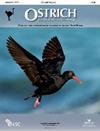尼日利亚中北部的一项民族鸟类学研究表明,传统的信仰体系和对秃鹫器官的交易导致了尼日利亚秃鹫的灭绝
IF 1.1
4区 生物学
Q2 ORNITHOLOGY
引用次数: 10
摘要
在整个非洲,各种秃鹫的数量正在迅速下降,包括保护区在内的大多数地区都有明显的下降。非洲国家秃鹫数量的突然下降,尤其是尼日利亚,是相当令人担忧的。秃鹰中最常见的一种,连帽秃鹰,现在很少见到了。本研究旨在确定传统信仰体系和秃鹫器官交易在尼日利亚秃鹫数量迅速下降中的作用。这项研究是在尼日利亚中北部地区的高原州进行的。采用半结构化问卷收集民族鸟类学数据;有访谈和实地观察的支持。数据收集采用分层随机抽样技术,在34个地区68个观察到秃鹫的点上进行。204名受访者都是在调查地点的偶然相遇中被选中的,以确定他们对秃鹫的看法。这项研究的关键发现揭示了秃鹫器官的大规模贸易,这可能是该地区秃鹫数量下降的原因。根据一些答复者的说法,有证据表明食用秃鹫肉。研究发现,人类和狗与秃鹫激烈的食物竞争是研究区域内秃鹫数量下降的另一个因素。许多人认为秃鹫是邪恶的;因此,他们经常被迫害。我们迫切需要提高人们对秃鹫在我们环境中的重要性的认识。审查有关濒危物种的法律并在执法机构的支持下实施这些法律也至关重要。应定期利用大众和社交媒体宣传活动,提高公众对秃鹫的重要性以及如何与秃鹫共存的认识和敏感性。应该建立秃鹫餐厅或人工喂食点,以帮助秃鹫数量恢复。本文章由计算机程序翻译,如有差异,请以英文原文为准。
Traditional belief systems and trade in vulture parts are leading to the eradication of vultures in Nigeria: an ethno-ornithological study of north-central Nigeria
The population of various species of vultures are declining rapidly across Africa, with noticeable declines in most areas including protected areas. This sudden decline of vultures in African countries, especially Nigeria, is quite alarming. One of the most common species of vultures, the Hooded Vulture, is now rarely encountered. This study was carried out to determine the role of traditional belief systems and trade in vulture parts on the rapid decline in vulture populations in Nigeria. The study was conducted in Plateau State in the North-Central region in Nigeria. Ethno-ornithological data were collected using semi-structured questionnaires; supported by interviews and field observations. A stratified-random sampling technique was employed for the data collection, which was conducted within 34 districts at 68 points where vultures were observed. The 204 respondents were all selected by chance encounter across the survey sites to determine their perceptions about vultures. The key finding of this research revealed massive trade in vulture parts for belief-base use, which might be responsible for the decline of vulture populations in the area. There is evidence of the consumption of vulture meat according to some of the respondents. Stiff competition with vultures for food by human and dogs was found to be another contributory factor towards vulture population decline within the study area. Many people believe that vultures are evil; hence, they are often persecuted on sight. There is an urgent need to create awareness about the importance of vultures in our environment. It is also vital to review laws on endangered species and implement them with the support of law enforcement agencies. Public awareness and sensitization of people using mass and social media campaigns should be conducted regularly on the importance of vultures and how to co-exist with them. Vulture restaurants or artificial feeding points should be created to aid population recovery.
求助全文
通过发布文献求助,成功后即可免费获取论文全文。
去求助
来源期刊

Ostrich
生物-鸟类学
CiteScore
2.10
自引率
30.00%
发文量
24
审稿时长
>12 weeks
期刊介绍:
Ostrich: Journal of African Ornithology is the leading ornithological journal in Africa, and publishes peer-reviewed scientific papers and short communications (
 求助内容:
求助内容: 应助结果提醒方式:
应助结果提醒方式:


